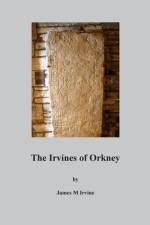von James M Irvine
38,00 €
The earliest recorded Irvine in Orkney was a William de Irwyn in 1369. This book draws on copious contemporary records that survive in Edinburgh, Kirkwall and elsewhere, together with implications of genetic genealogy, to develop fourteen lineages of William's alleged descendants. The author explores the growth of Orkney's largest private estate during the 16th century, its demise and resulting lawsuits during the 17th century, and the lives of peedie udallers and tenants in the parishes of St.Andrews, Deerness, Shapinsay, Sandwick and Stromness. Like other Orcadians, most Irvines worked the land, but readers also meet Irvines who became chief justices, bailies, burgesses, merchants, lairds, factors, tax collectors, kirk ministers, adulterers, witches, debtors or murderers, and who served on warships, merchantmen, arctic whalers, or for the Hudson's Bay Company, some of the latter taking native wives. The resulting genealogies illustrate clearly the potentials and limitations of the source material used to unravel this family's history. DNA tests have confirmed the various spellings of the surname have no significance but, surprisingly, the surname has two unrelated branches in Orkney. Contemporary title deeds, sasines, rentals, court records, parish registers, census data, testaments and gravestones have enabled seven lineages to be traced down to the present day. More generally, this book details a multitude of events that graphically illustrate the evolution of Orkney's fascinating local history. It throws fresh light on the practical implications of udal and feudal jurisprudence of inheriting land in Orkney, on the emergence of Orkney's merchant lairds, and on the impact of bad harvests, disease, migration and local and national politics on the fluctuating demography, fortunes and privations of rural Orkney's subsistence economy over five centuries. Readers of many disciplines will enjoy this holistic case study of Orcadian society.



